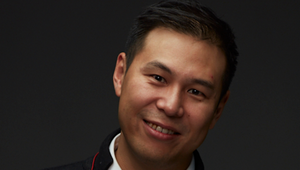
Bossing It: Emily Chang on Being a 'Caringly Assertive' Leader

Emily Chang is CEO of McCann McCann Worldgroup China. She joined the ad industry from her previous client-side roles as SVP marketing, Starbucks (based in Seattle); CMO, Starbucks China; chief commercial officer, IHG; and head of retail marketing Asia for Apple (all based in Shanghai). She also spent 11 years with P&G working across all three of their global business units.
With 20 years’ in customer experience, business strategy, cross-cultural team leadership, change management and brand building, Emily is a distinguished marketer and a proven leader with end-to-end business experience.
LBB> What was your first experience of leadership?
Emily> In middle school, I loved music and I loved my friends. So, on the weekends, I organised my friends to provide free musical performances at children’s hospitals and assisted living centres. This was just pure fun for me! Calling around to see who might be interested in hearing some teenagers play music… creating the perfect excuse to spend more time with my friends on the weekends… and then seeing the smiling faces of patients as they clapped and sang!
In fact, it was only after we named our group GRATIS and made matching t-shirts, that it seemed we were really a thing. And it turned out, I was the leader of the thing. Truly, until someone introduced us and referred to me as the leader of GRATIS, I honestly never thought of myself that way. I saw myself more as a connector and catalyst for something fun for us and useful for others.
Even today at work, that’s sort of how I see my leadership role and style. I love connecting and bringing amazing people together, and creating the environment for creativity, collaboration and fun.
LBB> How did you figure out what kind of leader you wanted to be – or what kind of leader you didn’t want to be?
Emily> I aim to be a “Caringly Assertive” leader. I’ve found that getting there has been a kind of titration process. Because leaning too much into “Caring” can give the perception that we lack clarity and direction, which may cause confusion or inefficiency. However, leaning too far into “Assertiveness” may be perceived as overly demanding, which can create a fear state, causing people to stay silent or close down.
It’s really about the combination of the two: True caring has positive impact, when underpinned by assertiveness. This looks like a leader who leans into tough conversations with thoughtfulness, compassion and respect. Because we care enough to do the right thing for the business and for people. Because we care enough to take responsibility and ownership, even in the difficult moments. I believe caringly assertive leaders make expectations and goals clear. They role model transparent communication and create a sense of safety in the workplace.
LBB> What experience or moment gave you the biggest lesson in leadership?
Emily> I’ve had the privilege of working for many phenomenal leaders over the last two decades. But Kenneth MacPherson, CEO of InterContinental Hotels Group, Greater China, taught me my biggest lesson in 2017. When my boss heard that our family was planning to adopt a Chinese boy we’d been caring for in our spare room, he quietly engaged HR to implement a new policy that supported employee adoptions. He then presented this new policy to me, telling me he hoped it made the process a little easier.
In that moment, staring at the paper in front of me, I was genuinely surprised and felt deeply touched. Our leader, with so many things on his mind, proactively went out of his way to demonstrate that he and the company were there for me and my family. This was an epiphany moment. If Kenneth ever needed anything, I’d bend over backwards, because I felt so personally valued and inspired by my boss. I realized in that moment, that leaders can focus less on this big concept of corporate culture and instead, more on inspiring followership through personal authenticity and genuine care.
LBB> When it comes to ‘leadership’ as a skill, how much do you think is a natural part of personality, how much can be taught and learned?
Emily> I think everyone’s shaped with a unique combination of skills, capabilities, passion areas, personality traits and quirks. Those who enjoy serving others, who get a sense of fulfillment from engaging with and coaching teams, are probably best designed to be successful leaders who thrive in the job. Sure, anyone can learn leadership skills, but if they don’t fundamentally love supporting others, they may find the job draining. To me, it’s about where and in which job a person can contribute most meaningfully and enter/close each day feeling that they’re doing just the thing they’ve been created to do.
LBB> What are the aspects of leadership that you find most personally challenging? And how do you work through them?
Emily> Each of our strengths can become a weakness when applied at the wrong time. So, my passion and curiosity can be strengths when the team needs energizing and engagement. But sometimes, it’s better to hold back, listen, and exhibit prudence. Instead of resolving conflict, I’ve learned to step back and manage the conversation so teams can resolve on their own, which builds esprit and new ways of working that can take us all into the future even more productively. I guess I don’t see this as a challenge, more of a daily opportunity… to be sensitive in the moment and understand what the people around me most need, and how I can be most helpful as a leader.
LBB> In terms of leadership and openness, what’s your approach there? Do you think it’s important to be transparent as possible in the service of being authentic? Or is there a value in being careful and considered?
Emily> Nothing hinders a potential relationship like inauthenticity. How can I feel like you want to get to know me, or feel prompted to want to get to know you, if you’re putting up a hard, shiny facade? If we seek to develop real connections, we need to be more open, taking down those polished walls and letting people in. So, I do believe we need to be authentic, which I’d define as identifying that unique combination of what makes us who we are and allowing others to see it.
That said, I also like what Brené Brown says: “Our stories are not meant for everyone. Hearing them is a privilege, and we should always ask ourselves this before we share: ‘Who has earned the right to hear my story?’" In the past, I’ve sometimes opened myself up to sharing private stories that the audience had not earned the right to hear. This was a mistake, and I’ve learned to differentiate between being transparent vs. sharing important, private stories that ought to be entrusted with a special few.
LBB> As you developed your leadership skills did you have a mentor, if so who were/are they and what have you learned? And on the flip side, do you mentor any aspiring leaders and how do you approach that relationship?
Emily> Absolutely, I’m a big advocate of mentorship. I’ve had the privilege of being mentored through formal mentoring programs and informal ones. Formal programs sometimes offer to match people together, which means we’re being mentored by leaders we don’t know well. This can provide a lot of new learning opportunity, which we’d otherwise miss. I’ve also benefitted from less formal mentors, who either generously extended an offer, or with whom I’ve engaged because I found them inspiring. These informal relationships come with a different, more personal dynamic. Both are incredibly valuable, and I’m incredibly grateful for all the mentors in my life!
Yes, I’ve also mentored quite a few younger people… it’s something that gives me a lot of joy. In fact, I’ve learned to be specific when people reach out with a request for mentorship. First, I start with seeking to understand what they’d like to learn, so I can assess my ability to add value. Both our time is valuable, so I want to ensure we are investing it wisely. Then, and it’s the same whether I’m mentor or mentee, I like to align on expectations. What will success look like? How often will we meet? Can we agree the mentee takes the lead on scheduling and proactively sharing an agenda prior to our meetings? Last but not least, at what time might we consider closing or evolving this relationship? If we don’t address this last question, healthy and productive mentorships can sometimes fizzle or erode, which can be such a shame. Rather, proactively outlining a rough construct can release the pressure of not knowing how to have that discussion later down the road.
LBB> It’s been a really challenging year – and that’s an understatement. How do you cope with the responsibility of leading a team through such difficult waters?
Emily> I think we enable our best selves when we’re rested and balanced. This means that it’s our responsibility to ensure we’re in a good, healthy place before we consider how we serve our teams – this requires intentionality and discipline! Here, I have a few scheduling hacks:
Look ahead to each week and prepare for meetings, so our time together can be as productive as possible. This means we offer prereading and clear agendas in calendar invites, as well as delineate the desired outcome of each meeting.
Scanning the week’s priority meetings and family commitments, carve out time for health & wellness. For me, this looks like morning meditation, fitness workouts, and reading time.
Schedule 50-minute meetings so that ten minutes are reserved for shifting gears to focus on the next thing, as well as building time for a quick breath, bio break, and getting to the next meeting room. This avoids a sense of built-up stress over the course of a day, or that sensation of chasing the puck because we’re constantly running a few minutes late.
Be available, using those extra minutes to walk the long way around. People will see you and may stop you for a quick chat or question, which they otherwise wouldn’t bother you with, via email or formal meeting. This practice creates a sense of personal familiarity which enables positive engagement.
With these practices, I focus on my three Ps (I know, lame… but helpful!)
Feeling Prepared for the day
Focusing on People, and
Moving at a healthy, intentional Pace.
LBB> This year has seen the industry confronted with its lack of action/progress on diversity and inclusion. As a leader how have you dealt with this?
Emily> Actually, I’m always inspired by how much emphasis McCann Worldgroup places on diversity, equity and inclusion. Our people really do come first, and it’s a source of enormous pride that we’re ranked as the #1 creative network for People & Diversity in APAC. That said, I think it’s important to have a clear, objective view of where we stand. This is enabled by numbers, so that we aren’t misled and feeling we’re in a good place if the statistics don’t support that we have brought people in from a diversity of background, experience and style. Then, it’s our job to set everyone up for success. That means we’re making time and space for people to engage together. It means we role model inclusion, opening opportunities for the quiet ones to share their thoughts and demonstrating authenticity by being open, vulnerable and real in the big moments as well as the small.
LBB> How important is your company culture to the success of your business? And how have you managed to keep it alive with staff working remotely in 2020?
Emily> The company culture and values at McCann are one of the key reasons I was so interested in this role! When I first interviewed with my boss, he told me that a spirit of generosity was very important to him and wanted to know what I thought about that. Well, I thought that was a wonderfully surprising thing to ask!
In fact, I was delighted to hear about our corporate BIG values… Bravery, Integrity and Generosity. When we state that these principles are what matter to us as a company, I think we set the foundation for a meaningful culture, which will draw those who are interested in doing meaningful work to join a family of warm, caring and generous people.
LBB> What are the most useful resources you’ve found to help you along your leadership journey?
Emily> Trusted people who want the best for me and the organization. Those who lean into transparent feedback with the intention of highlighting something I may not be aware of, so that I can do better. Lisa, my EA, proactively pops in to caution me on something I may be walking into. Alex, my boss, regularly engages with me to provide counsel and feedback. I trust our heads of finance and HR to thoughtfully consider a course of action and either encourage me onward, or provide alternative thoughts, which help us do the best thing for our teams. I think strong leaders look for these people and surround ourselves with those who will speak truth even when it’s counter to where we might be heading. You see, I believe we are sub-optimized when everyone around us agrees with everything we say, who only tell us how great we are. Rather, those who challenge preconceptions, interrogate assumptions and push us further are the most valuable partners. After all, iron sharpens iron.















